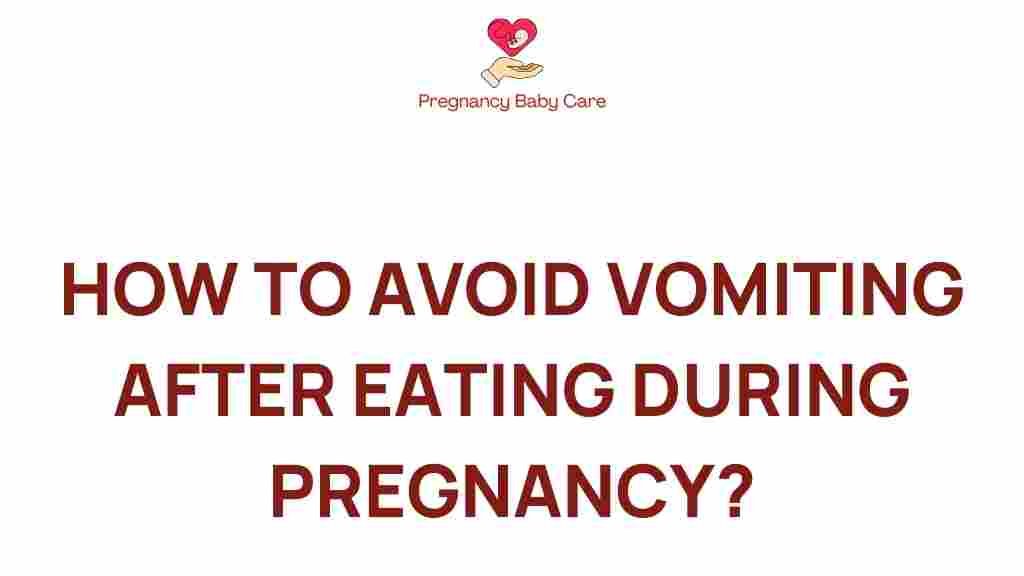Mastering Meal Times: How to Avoid Vomiting After Eating During Pregnancy
Pregnancy is a beautiful journey, but it can also bring its fair share of challenges, particularly when it comes to pregnancy nausea and morning sickness. For many expecting mothers, the experience of feeling nauseous or even vomiting after meals can be distressing, making it essential to find effective strategies to promote digestive comfort and maintain overall pregnancy health. In this article, we will explore practical tips and dietary changes that can help you avoid vomiting and enjoy your meals more fully during this special time.
Understanding Pregnancy Nausea
Pregnancy nausea is a common symptom that affects many women, especially during the first trimester. It can vary in intensity and may lead to vomiting, which can further complicate your ability to eat well. Understanding the triggers of morning sickness and how to manage them is crucial for a healthy pregnancy.
Step-by-Step Process to Avoid Vomiting After Eating
Here are some effective meal tips and dietary changes that can help you navigate your pregnancy while minimizing nausea and vomiting:
1. Eat Small, Frequent Meals
Instead of three large meals a day, aim for smaller, more frequent meals. This can help keep your stomach from becoming too empty or too full, both of which can trigger nausea. Consider the following:
- Snacks between meals, such as nuts, yogurt, or fruit.
- Eating every two to three hours.
2. Stay Hydrated
Dehydration can make nausea worse. Make sure to drink plenty of fluids throughout the day, but be mindful of how and when you hydrate:
- Drink fluids between meals rather than during meals to avoid feeling too full.
- Opt for clear broths, herbal teas, or electrolyte drinks.
- Avoid caffeine and sugary drinks, which can exacerbate nausea.
3. Choose the Right Foods
Your food choices can significantly impact how you feel. Here are some suggestions:
- Focus on bland foods, such as crackers, bread, and rice.
- Incorporate protein-rich foods like lean meats, eggs, and legumes.
- Include fruits and vegetables that are less pungent, such as bananas, apples, and leafy greens.
- Avoid spicy, greasy, or overly sweet foods that may trigger nausea.
4. Mindful Eating Practices
How you eat is just as important as what you eat. Consider these mindful eating practices:
- Eat slowly and savor each bite.
- Chew your food thoroughly to aid digestion.
- Listen to your body and stop eating when you feel satisfied, not overly full.
5. Incorporate Ginger and Peppermint
Both ginger and peppermint are known for their anti-nausea properties. You can:
- Drink ginger tea or chew on ginger candies.
- Inhale peppermint oil or sip peppermint tea to soothe your stomach.
6. Timing is Key
When you eat can also make a difference. Some tips include:
- Have a light snack before getting out of bed in the morning to help stabilize your stomach.
- Avoid heavy meals right before bedtime to prevent discomfort during the night.
Troubleshooting Tips for Nausea and Vomiting
If you find that nausea persists despite making changes to your diet, here are some additional tips to consider:
1. Keep a Food Diary
Tracking what you eat and your nausea symptoms can help identify specific triggers. Note the foods that seem to exacerbate your symptoms and those that help.
2. Consult with Your Healthcare Provider
It’s essential to discuss any persistent vomiting or nausea with your healthcare provider. They can provide tailored advice and may recommend safe medications or supplements to alleviate symptoms.
3. Consider Prenatal Supplements
Sometimes, pregnancy vitamins can cause nausea. If this is the case, discuss alternatives with your doctor, as certain formulations may be easier on your stomach.
4. Relaxation Techniques
Stress and anxiety can increase nausea. Implement relaxation techniques such as deep breathing exercises, yoga, or meditation to help keep your mind and body calm.
Conclusion
Mastering meal times during pregnancy can greatly enhance your overall experience and well-being. By understanding the nuances of pregnancy nausea and implementing effective meal tips and dietary changes, you can avoid vomiting and feel more comfortable as your body undergoes this incredible transformation. Remember, every pregnancy is unique, so be patient with yourself and consult with your healthcare provider for personalized advice. Prioritizing prenatal care and focusing on nutritious food choices will contribute positively to your pregnancy health and the health of your baby.
For more information on managing pregnancy symptoms, visit this resource. If you need further insights on nutrition during pregnancy, check out this guide.
This article is in the category Pregnancy and created by PregnancyBabyCare Team
